7 Best Pool Test Kits | The Top Rated Pool Testing Kits To Keep Your Water Clean
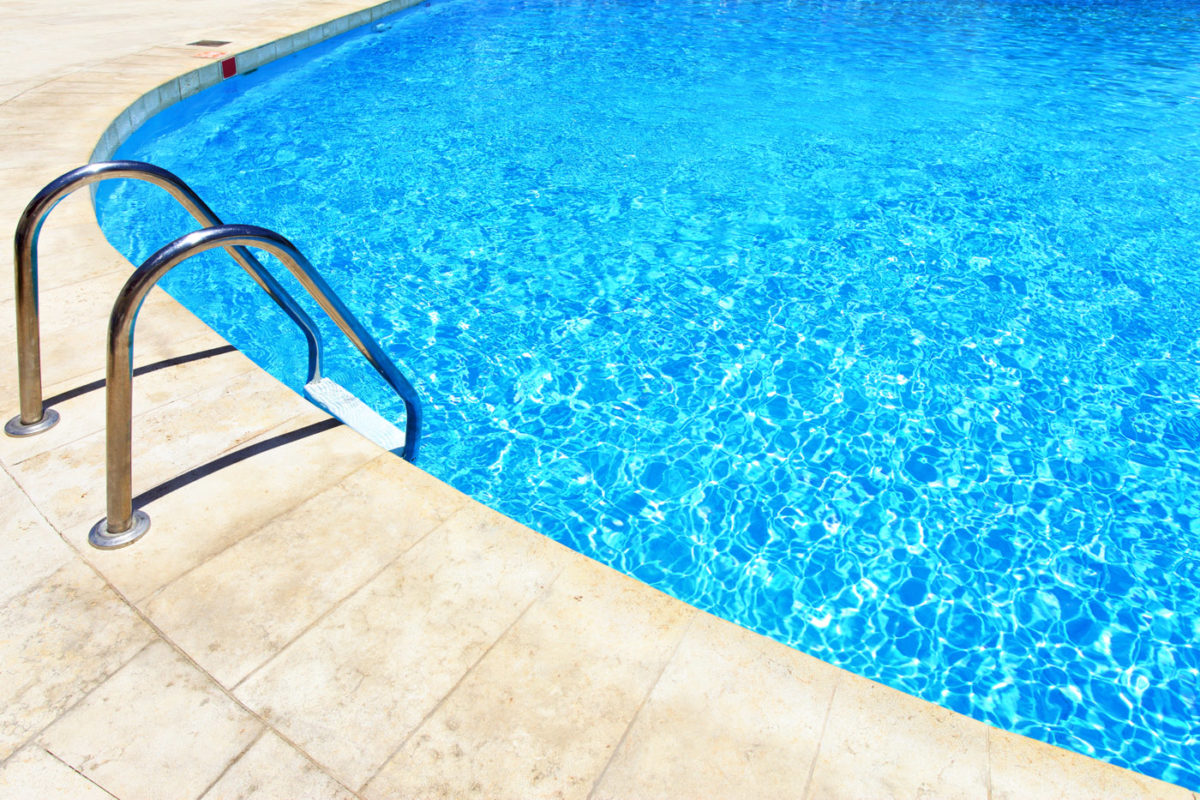
Are you tired of paying a pool company $300 a month to send a college boy over to test your pool? The best pool test kit can help you save hard-earned money. Even though your teenage daughters don’t want you to fire the pool boy, it makes economic sense to learn to do the process yourself, especially since there are so may pool testing kits available on Amazon.
Before you decide to do your own testing, it is important to really understand yourself. Are you a perfectionist who likes spending extra time to make sure something is perfect? Then consider purchasing one of the more complex kits. If you are someone who just wants to jump in the pool, green or not, perhaps you should purchase the testing strips and then take a pool sample in once a month to your local pool store. Here’s a quick list of our top pool test kits available today:
[table id=232 /]
Before we dive into the best pool test kits, let’s first learn a bit about pool maintenance.
How often do you need to test your pool?
This is a complicated question because several factors determine it. Here are the basics. Of course, you need to test your pool as soon as it is opened during the summer and before you close it in the fall. During the swimming season, experts say your backyard pool needs testing at least once a week. If your pool receives heavy use, testing needs to occur two or three times a week.
Related: Best Solar Pool Heater
Other factors that may increase the number of times you need to use one of the best pool test kits is if you have received a lot of rain, or if animals are enjoying the pool with you. Especially for those with little experience with pool maintenance, it’s a good idea to test the day after you placed new chemicals in the pool. Of course, when it comes to your family’s health, it is better to err on the side of caution. Also, don’t forget to test those hot tubs.
The Best Pool Test Kit: What are you testing for?
Pool owners should test for pH and chlorine levels one to three times a week.
-
pH Levels
Too low of a pH level will lead to red eyes and itchy skin. A pH level is too low when it falls below 7.0. If a pH level is too high, more chlorine will need to be added to the pool. You will also feel the effects of an inappropriately high pH level by having red eyes and dry skin. Also, your swimwear won’t last as long. The pH level is too high if it exceeds 7.6. (These numbers seem to alter depending on the source. Some experts say the pH should be between 7.2 to 7.8.)
On a side note, did you know that pH levels can be controlled with regular baking soda? Consider using baking soda if your water is too acidic – it may save you money.
-
Chlorine Levels
Chlorine loses effectiveness when the pH level is too high. That’s why these two tests run hand in hand. Chlorine levels need to stay between 1.0 and 3.0 ppm (parts per million.) To receive the correct levels keep this formula in mind. One ounce of chlorine will give you 1 ppm in 75,000 gallons of water. That means put in 0.013 ounces of chlorine per 100 gallons of water.
Too high of chlorine levels can be dangerous. Besides having itchy eyes and skin, swimmers enjoying a pool with high chlorine levels can have difficulty breathing. Swimming is already a sport where breathing is difficult. Your chlorine levels shouldn’t make it more difficult.
Since chlorine levels are super crucial in maintaining a healthy pool, let’s take a moment to discuss the different methods of testing it. All have advantages and disadvantages.
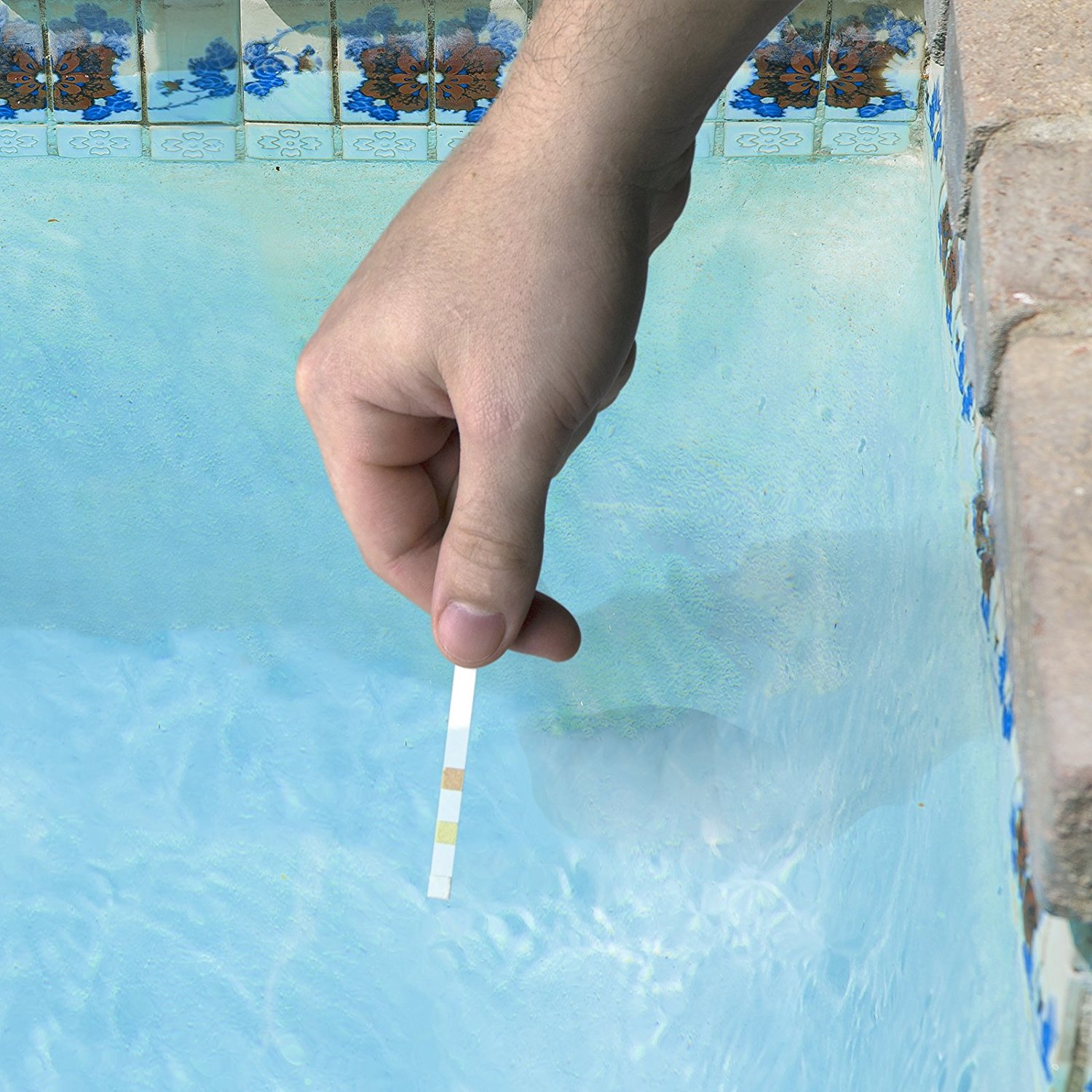
Liquid testing has been around the longest.
The first liquid testing kit was the OTO-Phenol liquid kit. Pool owners fill a test tube with pool water and then slowly add a reagent to the water. The water changes color and that color is matched with a color chart. The color determines the amount of chlorine in your water.
The advantages of this type of testing are that it can be very accurate if the directions are followed correctly. The disadvantages of this system are that it is not accurate if you don’t follow the directions. It also is not sophisticated enough to determine what type of chlorine is present in the water (more on this later.) Also, the liquid used in the testing kit is a known carcinogen.
Related: Best Pool Pump
The next type of system is the DPD liquid kit. This is also a very accurate test when performed correctly, and more sophisticated than the first liquid tester because it measures the free chlorine levels and total chlorine levels. Free chlorine levels are the most critical indicator of pool health. The disadvantage of this testing kit is that high levels of total chlorine may not accurately measure the free chlorine levels. This type of kit is usually more expensive as well and may be too complicated for the person just wanting to float around their pool with a beer.
Testing strips are the newest kid on the pool-testing block. Test kits are easy to use, and now test for all chemical levels. The disadvantage of this type of testing occurs when trying to measure the tiny testing strip to the color strip on the side of the bottle. Is that blue? Or is it green? Or maybe gray?
There are digital testers as well, but they are not cost-effective, and none of those types of kits will be included in the listing below.
-
Total Alkalinity
Test the total alkalinity level once a week. These levels don’t fluctuate quickly, and they should be between 80-120 ppm. If the alkalinity is too high, the water will appear cloudy, and deposits will develop on the pump, equipment, and on the sides of the pool. It can cause the water to turn green.
Related: Best Above Ground Pool
If the alkalinity is too low, the water can turn green as well. Do you see why pool testing kits are essential now? An inconsistent alkalinity level can also affect the chlorine levels. I’ll have my high school chemistry teacher call you to explain how the chemicals react to each other.
-
Calcium Hardness
Calcium hardness also only needs to be tested once a month, even though some sources say to test every two weeks. The levels should be between 200-400 ppm. If the calcium levels are too high, your water will be cloudy, and your pool and equipment will build up with calcium sediments. If the water is too soft, it becomes corrosive. This can also weaken your equipment and cause costly repairs.
-
Cyanuric Acid
I don’t know about you, but testing for something called cyanuric acid in your pool sounds hard-core. It sounds like something that a Bond villain would try to use to kill our favorite secret agent.
Apparently, cyanuric acid, sometimes called CYA, is a pool stabilizer. Its levels should be between 20 and 50 ppm. If the levels are too high, the chlorine won’t work, and you have wasted time and a lot of money. Again, depending on the sources, cyanuric acid levels should be tested at least once a month.

Shocking the Pool
“Shocking” your pool is a vital component of maintaining a healthy swimming environment. Even though I can think of a lot of things I would see at the pool that would shock me, the term shocking refers to adding chlorine or other chemicals to the pool to raise the level of free chlorine. Chlorine kills the nasties in your pool – like algae and bacteria.
Related: Best Inflatable Pool
Shocking is necessary when algae begins to grow in the pool or when the free chlorine level of your pool measures zero. Do you see how important those testing kits are now? The number of times this will be necessary depends on the use of your pool and how much sunshine you get.
How do you do it? Test the free chlorine level of your pool Add enough chlorine to reach the breakpoint chlorination level. Your overnight free chlorine test should read 1.0 ppm or less after shocking the pool, and your water should become crystal clear.
Tips for Water Testing with the Best Pool Test Kit
Now that you know what type of chemicals you are testing for, here are some general suggestions on how to check for the different chemical levels.
First, make sure the water you test is 12-18 inches below the surface of the pool. Some experts recommend an elbow’s length into the pool. If you don’t get a deep enough sample, your test may be inaccurate. Chemicals alter depending on the amount of sunshine or rain the pool receives.
Especially if you are having issues with chlorine levels, do your water testing in the morning.
Follow the instructions for the testing strips. If the instructions say to read the testing strips after 20-30 seconds, follow those instructions. Reading the testing strips too soon or too late will lead to inaccurate results. If the testing kit says to add five drops of the reagent, add five, not six or seven. If the instructions say to swish the product, swish it and don’t shake it. It may seem silly but not keeping the chemicals in check can wreck expensive equipment in your pool.
Take your samples away from the return jets or outlets. For some reason, chemicals become concentrated around these areas. This causes the readings to be inaccurate.
Keep your testing supplies in a cool, dark place and pay attention to expiration dates. Old testing strips will not work as well. Keep supplies tightly capped.
Related: Best Pool Heater
Pay attention to the expiration date of chemicals and testing strips. Check those expiration dates when you purchase the product. If the manufacturing company or salesperson says they don’t matter, return the product and get your money back.
Don’t touch the testing strips or water samples before you test them. Your fingers have all sorts of contaminants on them. Don’t cover the testing tube with your finger. This contaminates the sample and makes the date you collect unhelpful.
Run your pump 15-30 minutes before testing.
The 7 Best Pool Test Kits
Now let’s take a look at the pool kits available on America’s favorite retailer – Amazon. We will examine seven different pool test kits– some look like a mini chemistry lab and others are a simple tube with test strips. We will see which products have the highest reviews and determine what is the best kit for the money.
The first product is…
1. Taylor Technologies K-2006 Test Kit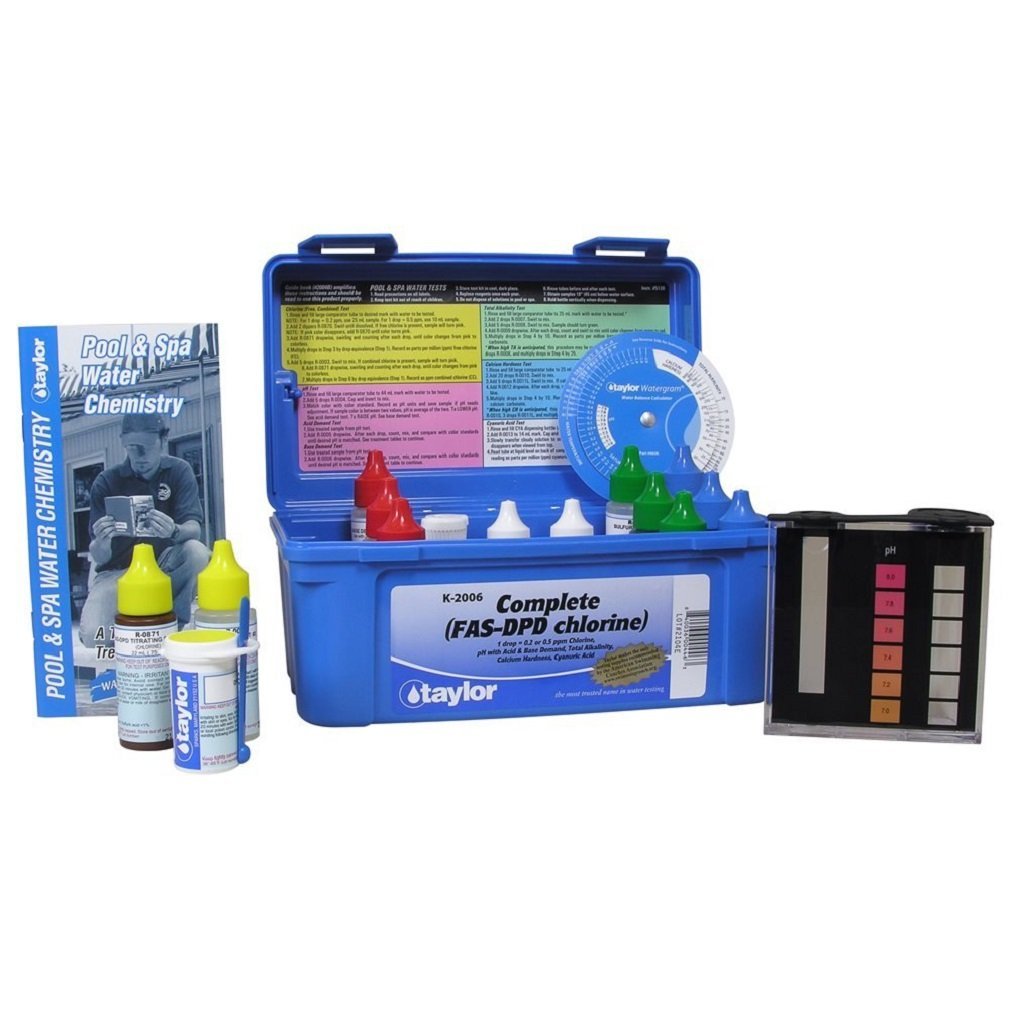
Type of kit
This is a DPD powder kit, meaning that it tests for free and total chlorine levels. According to the company, DPD powder is more accurate than DPD liquid testing kits. It comes with .75 ounces of reagent and includes a Taylor 9058 comparator. It does not use test strips.
Size of the kit
The Taylor kit comes in a small, blue tackle box. The box is 9.5 inches x 6 inches x 4 inches. It weighs two pounds.
Price, rating, and number of reviews
The Taylor K-2006 sells for $54.94. It has received 4.4 out of 5 stars, and customers have reviewed it 807 times.
Chemicals tested
The Taylor kit tests for total and combined chlorine, pH, alkalinity, calcium hardness, and cyanuric acid.
The Plus Side
Customers leaving positive reviews were happy because following the advice from the kit allowed them to save money. By following the testing advice, they did not have to hire expensive pool companies or buy additional chemicals from the local pool store. Customers say the results are easy to read and seem to be accurate. Some people who purchased the product were so enthusiastic that they wished they would have bought it years ago.
Overwhelmingly, customers seem happy to cut costs by taking care of their pools on their own.
The Drawbacks
Even though hardly any of the reviews are scathing, customers do have some concerns about this best pool test kit. Some said the containers were difficult to open and close. Others said the powder from the chlorine testing kit was in chunks and challenging to break up for the testing. Also, if you do not purchase reagent refills, the bottles only hold two ounces. These larger bottles did not fit into the small box. While the testing kit seems to work great for chlorine, it’s not as efficient for testing the pH levels. Some customers had problems with the products leaking in shipment and arriving empty. It does not seem as if the company interacts with those negative comments on Amazon like other retailers on this list do.
Most of the drawbacks regarding this product revolve around the same two things. One, this pool test kit is sometimes more complicated than people expect. Secondly, check the date on the chemicals in the kit to make sure they are not expired.
Other notes
The Taylor kit can be used on saltwater pools, but the kit does not include a tester for sodium chloride. It includes a book that explains what to do when tests come back with levels that are not optimum. The cheat sheet for testing is located on the lid of the kit and is waterproofed. This kit can be used in an above ground and in-ground pool. Someone writing a customer review reported that they received top-rate customer service by calling the company and asking for advice.
[su_button url=”https://amzn.to/2NMaCkL” target=”self” style=”flat” background=”#fb8746″ color=”#ffffff” size=”10″ wide=”no” center=”no” radius=”8″ icon=”icon:shopping-cart” rel=”nofollow” class=”bestvacbutton”]Buy Taylor Technologies K-2006 Test Kit[/su_button]
2. AquaChek 551236 7-Way Pool Water Test Strips
Type of kit
This kit includes a bottle of test strips that test seven different chemicals within your pool. The instructions say to dip the testing strip into your pool and wait 15 seconds. After the required length of time, compare the colors on the strip to the colors on the side of the bottle.
Size of the kit
The product dimensions are 1 inch x 1 inch x 1 inch. The kit weighs .64 ounces and comes with 100 testing strips.
Price, rating, and number of reviews
The AquaChek kit costs $16.47. It has earned 4.4 stars, and customers have written 1,099 reviews. Four bottles of this product can be purchased at a discount. Right now the price is $54.99 for four bottles. Reviewers said that one bottle would last for three seasons, but I guess there are some people lucky enough to live where a pool can be used all year long.
Chemicals tested
Even though other reports said that testing strips could not differentiate between free and total chlorine, the AquaChek kit lists both as chemicals that are tested. Other chemicals tested by the AquaChek include bromine, total hardness, total alkalinity, pH and cyanuric acid.
The Plus Side
Many happy customers were excited to be able to test free and total chlorine using a testing strip. These are the same strips that many pool stores use to test water when customers bring it into the store.
Overall, this test pool kit is economical and extremely easy to use. You may want to purchase a more thorough system to use a couple of times a year, but these simple testing strips are great for frequent use.
Drawbacks
Some of the reviewers said that their product was expired when they purchased it, and again, it seems that there is not a company representative watching the comments for their products on Amazon. It seems as if this is a missed opportunity. Some companies monitor these comments carefully and can provide impressive customer service by following up on the complaints of their customers.
Overall, most drawbacks relate to the accuracy of the pH levels. It tends to test on the low side for those levels.
Other notes
The AquaChek testing kit can be used for saltwater pools, but it will not test the levels of sodium chloride in the water. They work for above and below ground pools. This is a very basic kit. It does not come with a book explaining what to do if the levels are not as they should be. The discussion online said that if the levels weren’t off, you would need to go to a pool store or watch YouTube videos to determine your course of action.
[su_button url=”https://amzn.to/2NMaBxd” target=”self” style=”flat” background=”#fb8746″ color=”#ffffff” size=”10″ wide=”no” center=”no” radius=”8″ icon=”icon:shopping-cart” rel=”nofollow” class=”bestvacbutton”]Buy AquaChek 551236 7-Way Pool Water Test Strips[/su_button]
The third best pool test kit is…
3. The Poolmaster 22211 Smart Test 4-Way Pool and Spa Test Strips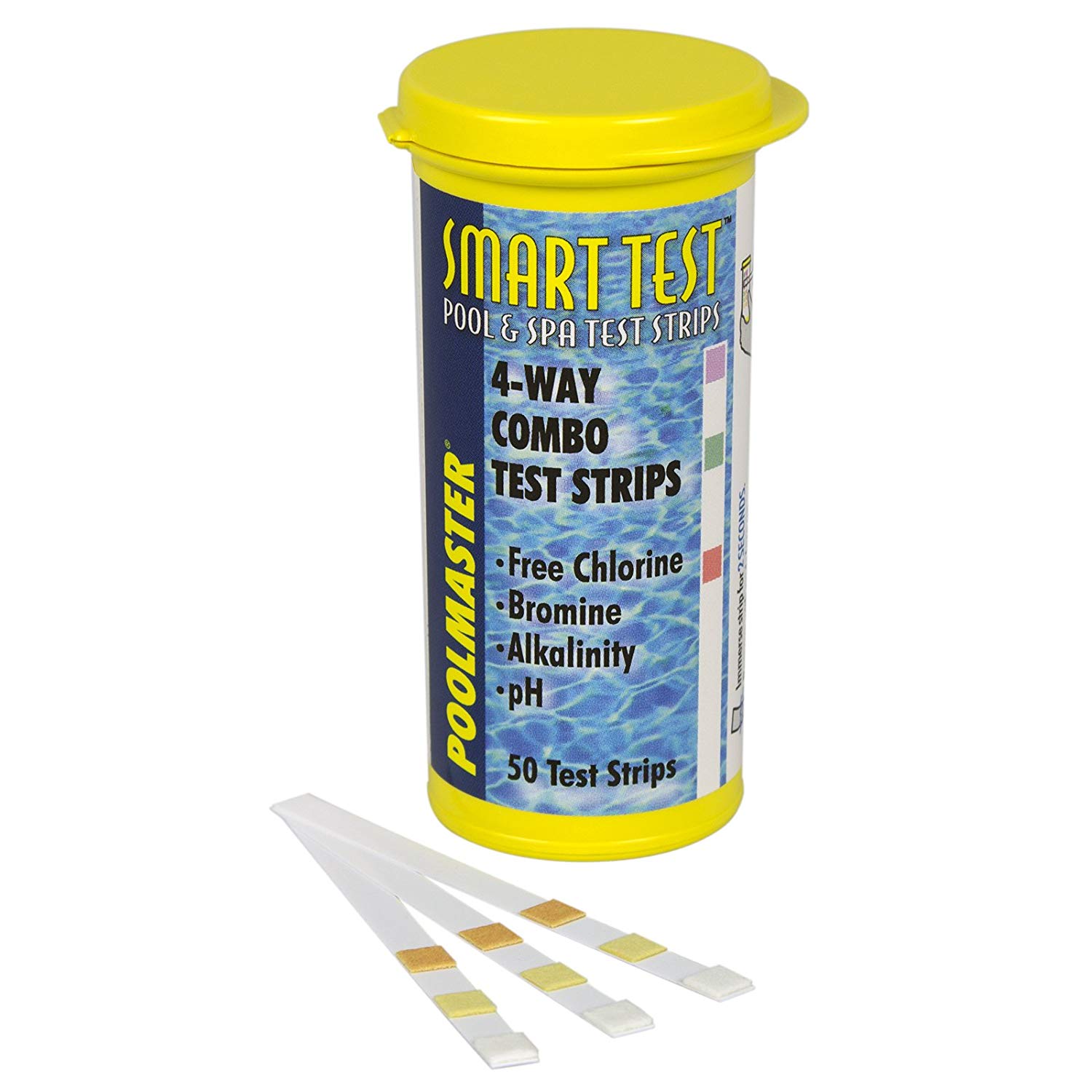
Type of kit
Like the last product, this is a container of testing kits that checks a variety of chemicals within your pool.
Size of the kit
The kit is 1.5 inches x 2 inches x 3.5 inches. It weighs 1.44 ounces. There are 50 strips in every container.
Price, rating, and number of reviews
The Poolmaster 22211 is rated 4.1 out of 5 stars. Just over 1,000 customers have rated the product.
Chemicals tested
The Poolmaster testing kit rates free chlorine, bromine, alkalinity, and pH. The color comparison kit is on the side of the bottle, just like the previous product reviewed.
The Plus Side
The positive reviews are not very specific. Overall, they seem to indicate that the test performed as well as to be expected, and they were happy with the quick response time and how inexpensive the product was compared with the competition.
Drawbacks
Don’t leave your container of strips open overnight or the product will become unusable. This isn’t necessarily a drawback, but more of a warning to keep the lid closed. Several other customers said that even after storing their strips inside their home, they quit working after several day’s use.
The biggest complaint is that these strips are not as accurate as they could be when it comes to testing the chlorine or the pH levels. This caused several customers to over chlorinate the pool, so beware of that and lean towards the side of caution.
Other notes
The company that makes this product has been in the pool testing industry since 1958. The company says the testing strip needs to go at least six inches into the water. Poolmaster warns that the testing strips cannot get wet until used to test your pool’s water. The container they provide can be opened and closed with one hand. The testing kit will work on saltwater pools, but again, it does not test for salt levels. There is no booklet accompanying this product that tells the consumer what to do if the levels are not standard. Customers report they need to go to YouTube or their local pool store to find ways to fix their pool chemical problems.
[su_button url=”https://amzn.to/2TkA3zz” target=”self” style=”flat” background=”#fb8746″ color=”#ffffff” size=”10″ wide=”no” center=”no” radius=”8″ icon=”icon:shopping-cart” rel=”nofollow” class=”bestvacbutton”]Buy The Poolmaster 22211 Smart Test 4-Way Pool and Spa Test Strips[/su_button]
The best pool test kit number four is another Taylor testing kit…
4. The Taylor Deluxe DPD Pool and Spa Water Test Kit (K-2005)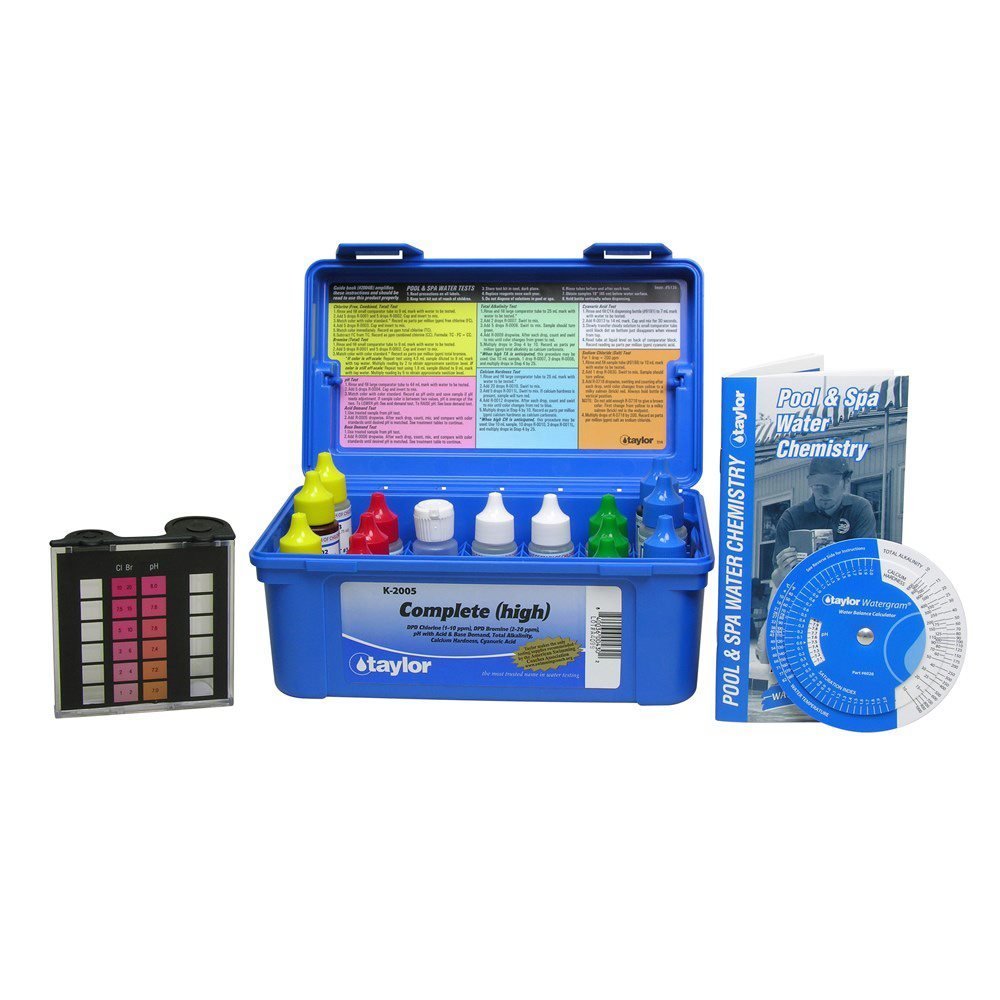
Type of kit
Like the first product, this is a DPD kit. This is designed for use at a professional level – for public or semi-public pools. Depending on how picky you are about your water quality, this could be the right kit for you.
Size of the kit
This kit comes in a small tackle box. The size of the box is 9 inches x 5.5 inches x 4 inches. It weighs one pound.
Price, rating, and number of reviews
The Deluxe Taylor kit costs $52. It has earned 4.4 out of 5 stars, and 96 customers have written reviews on this product.
Chemicals tested
This product tests the levels of total chlorine, free chlorine, bromine, pH, acid demand, base demand, total alkalinity, calcium hardness, and cyanuric acid. This product tests more chemicals than the other Taylor product.
The Plus Side
This pool test kit product appeals to those precise people out there who enjoy learning about water chemistry. Some of the reviewers even admit to being scientists and say they enjoy the process of learning about the chemicals reactions with each other in their backyard pool.
On the plus side, this pool test kit comes with a wheel that’ll tell you exactly what the outcome of the tests mean so you can make the best decisions for the well-being of your pool.
Overall, customers rave about this kit for its accuracy. Several reviewers had positive things to say about all Taylor testing products.
Drawbacks
On the downside, nearly all complained about the same thing… this pool test kit was too complicated. Although, it seems the more complicated testing kits are the most accurate.
Other notes
Like the others, this testing kit can be used for saltwater and chlorine-based pools. This is the only kit that has different bottles for saltwater testing over the other type of testing.
[su_button url=”https://amzn.to/2ERivCi” target=”self” style=”flat” background=”#fb8746″ color=”#ffffff” size=”10″ wide=”no” center=”no” radius=”8″ icon=”icon:shopping-cart” rel=”nofollow” class=”bestvacbutton”]Buy The Taylor Deluxe DPD Pool and Spa Water Test Kit (K-2005)[/su_button]
The fifth best pool test kit goes to…
5. The HTH Pool Test Kit (1173)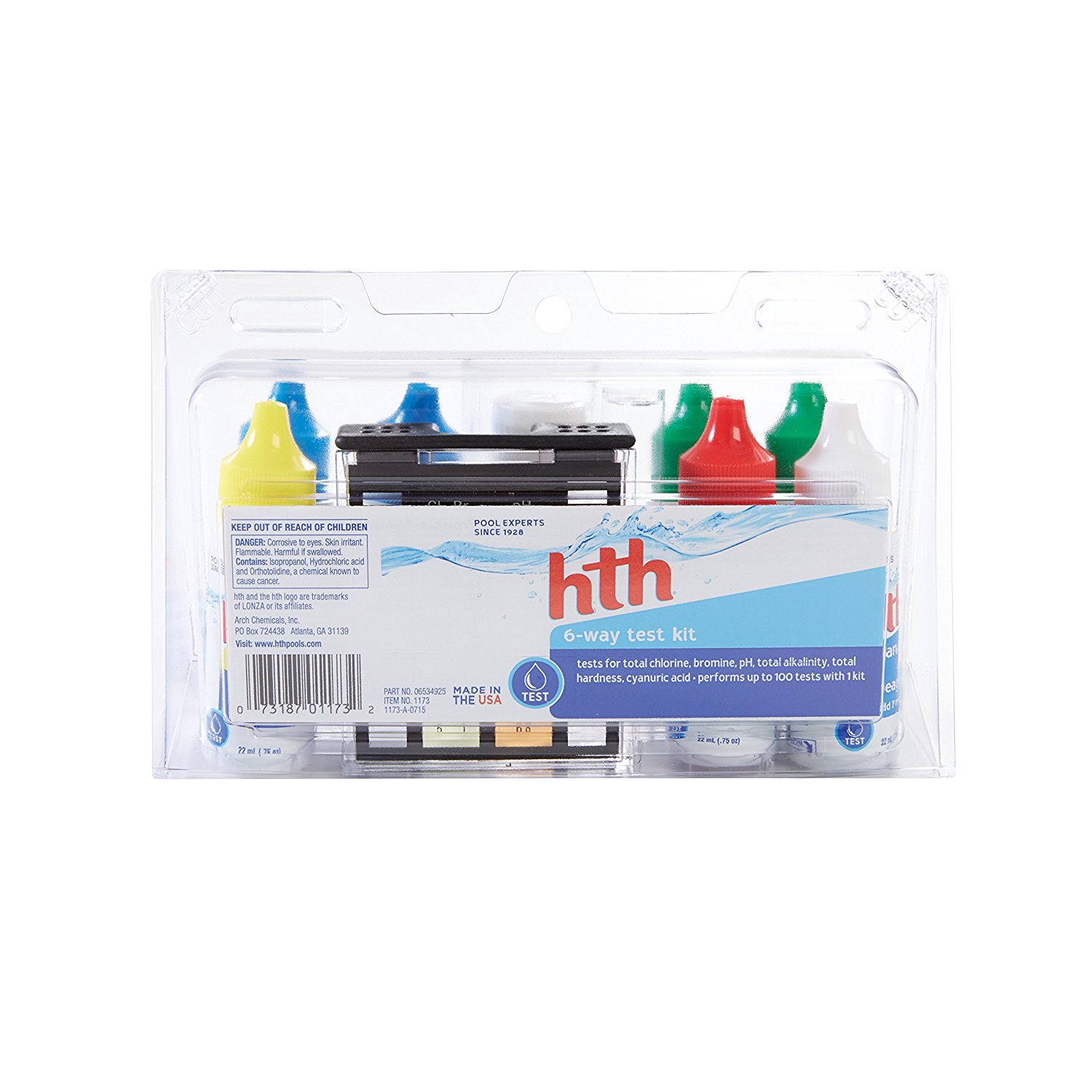
Type of kit
From what I understand about pool testing kits, this HTH Pool test kit seems similar to what was used in the past. Customers collect their water once a week. To test the total chlorine (real chlorine is not tested with this product), you add five drops of OTO to your water sample. After you cap the sample, you invert it to mix. The resulting substance’s color needs to be matched with a color on a chart. This process needs to be repeated for the bromine and pH testing.
Size of the kit
The kit is 2.6 inches x 6.9 inches x 4 inches. It weighs 1.44 ounces. The kit performs 100 tests. Each testing reagent bottle holds .75 ounces.
Price, rating, and number of reviews
The HTH kit costs $22.49. It has received 19 customer reviews and is rated 4.4 out of 5.
Chemicals tested
The HTH kit tests TOTAL chlorine, bromine, pH, total alkalinity, total hardness, and cyanuric acid. Note, as mentioned earlier, the total chlorine number does not offer as valid of reading as the real chlorine number provides.
The Plus Side
This kit kit works as promised. No one seemed worried about the type of chlorine level tested. Plus, it comes with an app to help simplify the use of this product.
Drawbacks
Besides complaining about inaccurate readings, there are some other valid complaints about this product. You are unable to buy a refill of one of the reagents. This is a pain because you use some of the drops more often than others. Also, the product does not come in a sturdy carrying case. Instead, it arrives in a cheap, plastic clamshell—this may or may not be a deal breaker for you. The color comparison card was also not waterproof, which just seems like poor planning.
Other notes
Even though this testing kit is very different than the other products listed, they are one of the only ones to offer an app that works with their system. Customers are encouraged to download the app and input their water results. After doing so, you can see the immediate analysis of your water. The app then provides step-by-step treatment recommendations for balancing your pool’s water. A handy pool-size calculator is included to help you determine the amount of chemicals you need to add to your water. Pool owners can save the history of their water tests so you can easily compare the results from day to day. They even provide videos on pool maintenance and other common pool problems. I wonder if they provide a video on how to get the neighborhood kid to go home and quit using my pool.
The other unique thing about this product is that the customer service department interacts with questions on Amazon. Although this is refreshing, the only response they leave is for the customer to call a toll-free number to get the answer to their question. I’m not sure why they didn’t just answer the question in the first place.
This product tests for salt-water pools, but does not test the salt levels per se.
[su_button url=”https://amzn.to/2XG1gvf” target=”self” style=”flat” background=”#fb8746″ color=”#ffffff” size=”10″ wide=”no” center=”no” radius=”8″ icon=”icon:shopping-cart” rel=”nofollow” class=”bestvacbutton”]Buy The HTH Pool Test Kit (1173)[/su_button]
The sixth best pool test kit on the list is….
6. JED Pool Tools Inc. 00-481 Standard Dual Test Kit
Type of kit
This kit is a combination reagent and test strip kit. It is an OTO testing kit, which means you need to be precise when going through the testing process. It is also unable to determine the levels between total and real chlorine. As mentioned earlier, the OTO reagents may be carcinogenic.
Size of the kit
There are four different bundles available for this product. The first bundle (confusedly) is for Aquachek Salt Test Strips. There are 10 in the bottle. There is no sizing information available for this product.
The second product under this listing is the JED Pool Tools AquaChek Test Strips. There are 50 strips in this container. It checks for seven different pool chemicals. No sizing information is available.
The third product under this listing is a blue case with liquid reagents and collection tubes. It tests the chlorine level and pH level of your pool water. Each reagent bottle holds .5 ounces of solution. This product’s case is 7.2 inches x 1.2 inches x 11 inches. It weighs 5.6 ounces.
The fourth product under this listing is a bundle. It includes the blue carrying case that holds the chlorine and pH testing kit, and it also consists of the AquaChek Test Strips.
Price, rating, and number of reviews
Since there are four products under this listing, the pricing is complicated. The only item that can be shipped with Prime is the third product listed above. It is the blue case with reagents that test chlorine and pH levels. It is $7.39.
The other products listed have incredibly high shipping rates. The salt testing strips are $8.67 plus $14.49 for shipping. The set of 50 testing strips that test seven different pool chemicals is $7.11 plus $20.30 shipping. The bundle of the testing strips and the reagent case is $36.49 and $29.03 shipping. The product description says it is made in China, but the photo of the product says it is made in the USA. Maybe the case is made in the USA?
Unfortunately for the company, all the products are lumped together under one rating. Only 287 people have reviewed this product, and it has earned 3.4 out of 5 stars.
Chemicals tested
The blue case contains reagents to test for chlorine and pH levels. The testing strips look at free chlorine, total chlorine, bromine, alkalinity, cyanuric acid, pH and total hardness. The salt test strips look at the range of sodium chloride in the water.
The Plus Side
Some of the positive reviews said that the product performs as it should. Although, if you are colorblind you may struggle to use this pool-testing product.
Drawbacks
One drawback to this pool test kit is that it is difficult to see the difference in the yellow gradient. Some said that the bottles leaked and that made it difficult to add the recommended number of drops to the water sample. Others said their products showed up half-empty. You do have to pay money to return this product.
Other notes
Twenty percent of the reviewers gave this product one star. This does not bode well for this product. I would proceed with caution. This is the only product that is on our list that also includes a sodium tester.
[su_button url=”https://amzn.to/2ESwYxW” target=”self” style=”flat” background=”#fb8746″ color=”#ffffff” size=”10″ wide=”no” center=”no” radius=”8″ icon=”icon:shopping-cart” rel=”nofollow” class=”bestvacbutton”]Buy JED Pool Tools Inc. 00-481 Standard Dual Test Kit[/su_button]
Finally, the last best test pool test kit we will be discussing is another test strip kit.
7. The Milliard 5 in 1 Spa and Pool Water Test Strips
Type of kit
This water testing kit includes a cylinder containing testing strips.
Size of the kit
The container measures 3.7 inches x 1.7 inches x 1.7 inches. It weighs 1.17 ounces.
There are 50 strips in the container.
Price, rating, and number of reviews
The product is $8.99. It is rated 3.5 out of 5 stars and has 173 customer reviews.
Chemicals tested
Each strip tests for free chlorine, total chlorine, overall pH, water hardness, and total alkalinity. Customers say it also checks for bromine but not for cyanuric acid.
The Plus Side
Half of the product reviewers gave this product five stars. They said the product performed as expected. Most people like that the 50 testing strips are bundled and packaged separately every ten pieces.
Drawbacks
On the other hand, some people disliked the extra packaging inside the product because it is difficult to open and uses more resources. A common problem with many test strip kits, it is not unheard of to receive a strip that is out of date by a couple of months. Also, the colors on the strips don’t exactly match the colors on the label, which can make it a little challenging to understand the readings. Also, the label fades quickly, so it’s important to compare the color strips as quickly as possible for accurate results.
Other notes
This is the only testing strip container that says the strips are bundled in groups of 10 and packaged separately. This is a nice feature, as it would protect the strips if the container accidentally falls in the pool. I’m assuming that happens quite a bit for products such as these.
The instructions say to dip the testing strip into the pool for 15 seconds before receiving a reading.
[su_button url=”https://amzn.to/2TBxDMr” target=”self” style=”flat” background=”#fb8746″ color=”#ffffff” size=”10″ wide=”no” center=”no” radius=”8″ icon=”icon:shopping-cart” rel=”nofollow” class=”bestvacbutton”]Buy The Milliard 5 in 1 Spa and Pool Water Test Strips[/su_button]
So, which of the best pool test kits is really the best?
It depends on how you see yourself. If you are scientific and precise, then, of course, buy one of the Taylor kits. I would recommend the deluxe package since it is the same price as the first Taylor kit listed.
If you just want a fast check, try using the AquaChek testing strips. Keep in mind what customers said about inaccurate pH levels on this product. You might have another system to check those levels in place because this is one of the most critical readings you have to take for your pool.
Besides testing water quality, there are other things to keep in mind when maintaining a pool. Of course, skim out the debris every day. Be vigilant in removing leaves, sticks, and other debris found floating in the water. Also scrub the sides of the pool down at least once every two weeks. It will keep your pool looking new for years to come.
Cleaning your pool doesn’t end with the water and the walls. Also, keep in mind that the pool filter needs cleaning at least once a week. You might need to clean the pipes that feed your filter system. Check the maintenance guide on how to do this. Also, don’t forget about cleaning the deck around the pool. A power-washer set on medium should do the trick.
One thing beginning pool owners fail to do is to pay attention to the water level. The level needs to be halfway up to the opening of your skimmer. If the water level is too low, add more water using the garden hose. If it is too high from a deluge of rain, rent a submersible pump. Don’t forget to recheck the chemicals after you add or take away water!
Do you need a tip from the pros? Our body’s natural oils can be removed from the pool with a . . . are you ready for it? A tennis ball! The fibers covering the outside of the ball soak up some of the oils in the pool.
If you live in the same area as I do, and winters are harsh, make sure you winterize your backyard pool. Blow water out of the supply lines and invest in a good cover. Make sure the water is at the right levels before storing your pool away for the winter as well. That’s another reason to invest in a functional testing kit!
It’s a good idea to call in a service technician once a year. Pay attention to any loud sounds coming from any of the equipment or any smells coming from the water. Look for small leaks that can quickly turn into significant leaks. Pools are an expensive addition to your home, so you might as well spend the money to take care of it, or it will become not only an eye-sore but a danger as well. The service technician can also talk to you about alternatives for heating your pool. This is one of the costs many homeowners may not think about when putting in a new pool. Keep your pool’s temperature as cool as possible for a refreshing dip, and to also save on energy bills. Those living in sunny climates can check into solar covers to keep your pool as comfortable as possible.
Regardless of what system you choose to test your pool, remember to be a vigilant pool owner. Monitor children and pets at all times if you have a pool in your backyard. Teach children how to swim – without floaties or other PFDs. There are classes in large metropolitan areas that teach even infants to be able to survive in water.
Make sure you have a secure four-foot fence around your pool and consider adding an alarm to let you know when someone might be there that you didn’t invite. Keep your spas and pools covered when not in use, and learn CPR for adults and children. Also, be careful when consuming alcohol or any other substance that would affect your decision-making abilities around a pool.
Enjoy your clean and safe pool. Happy splashing!
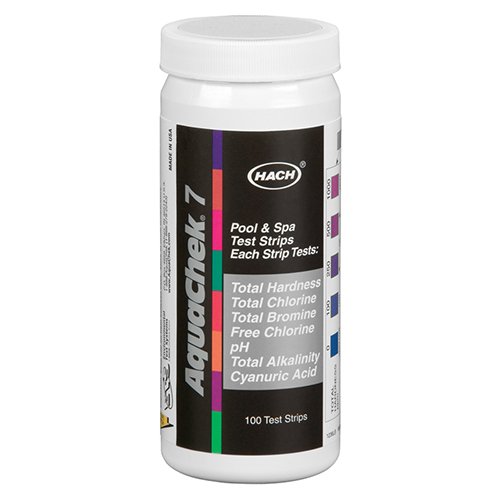
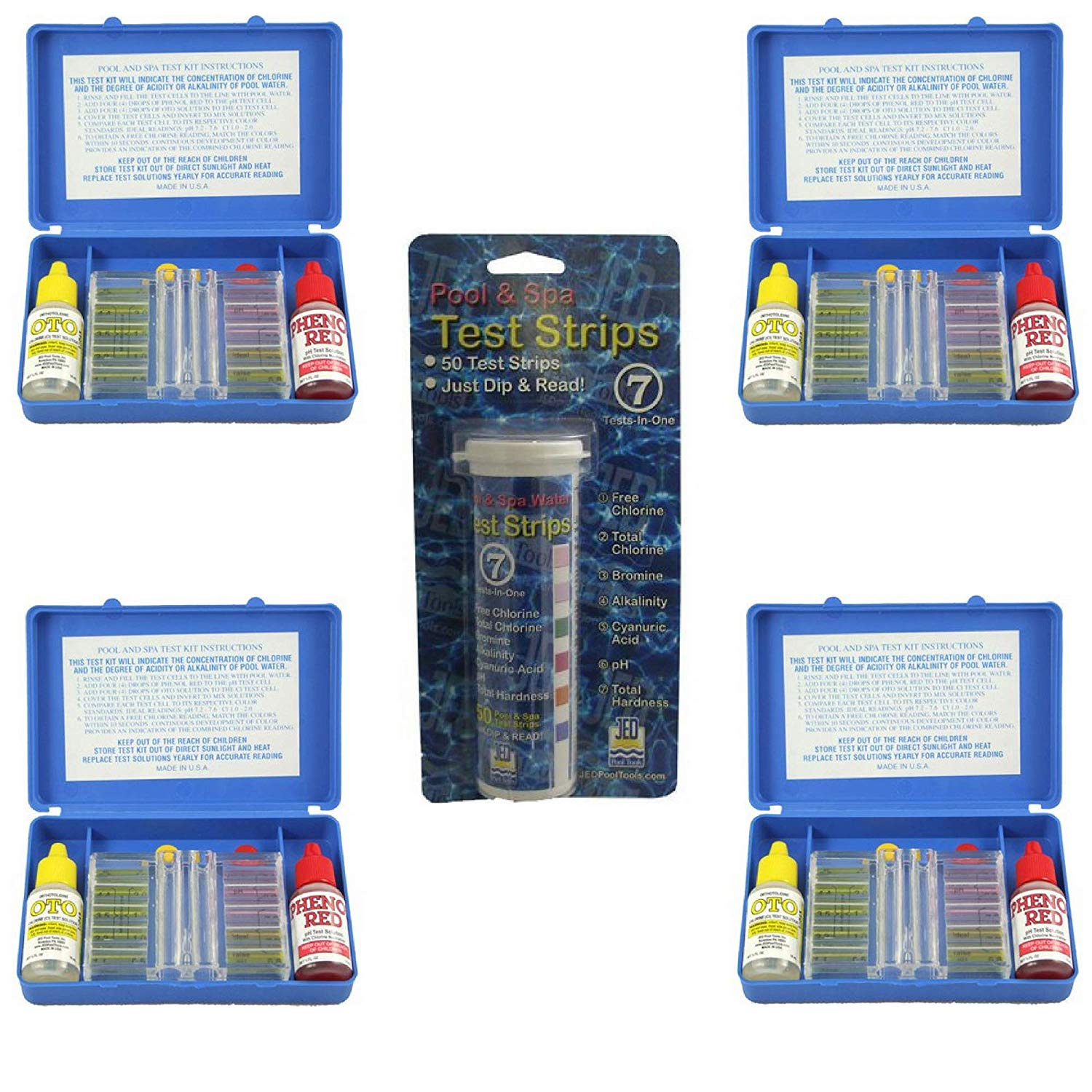
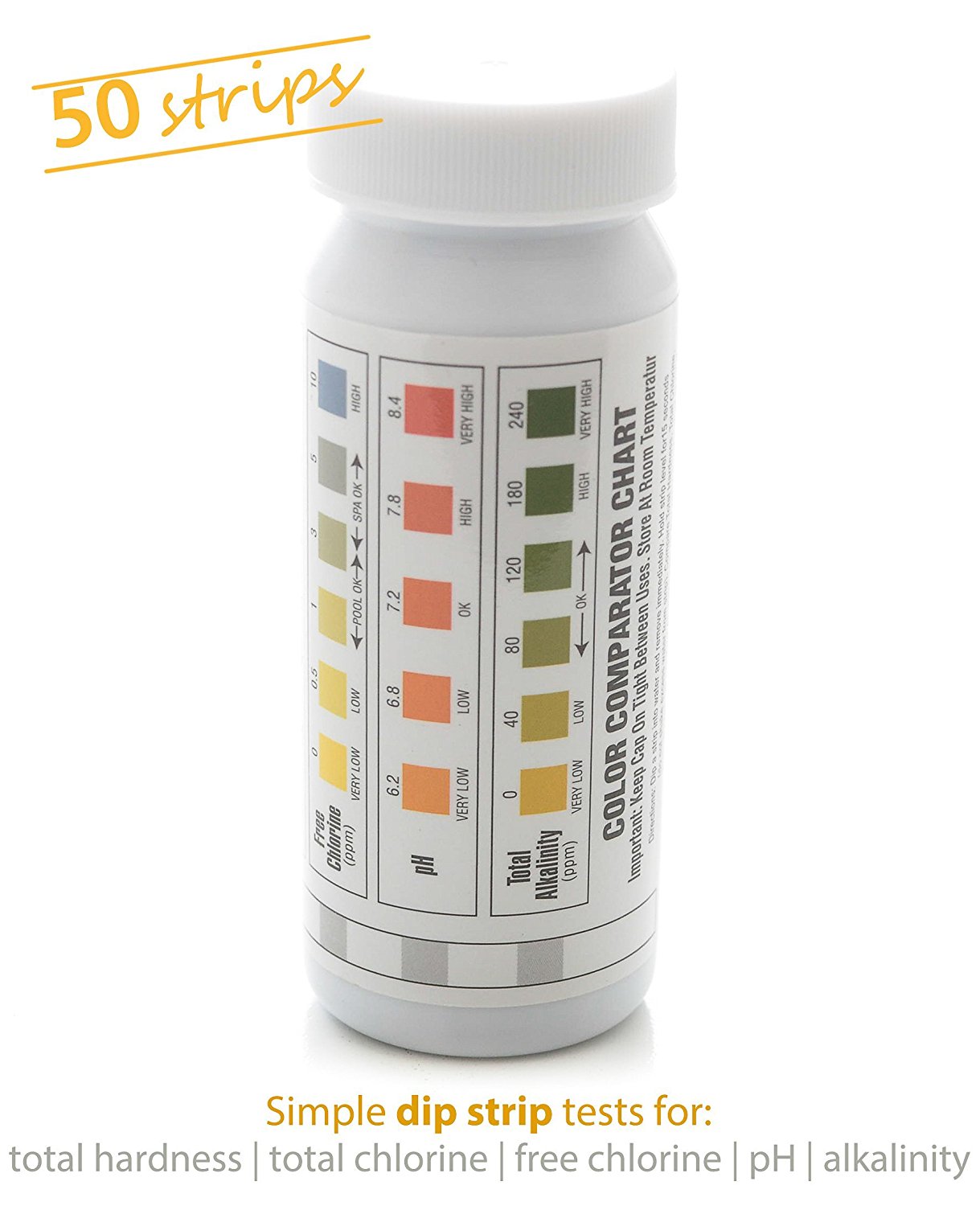
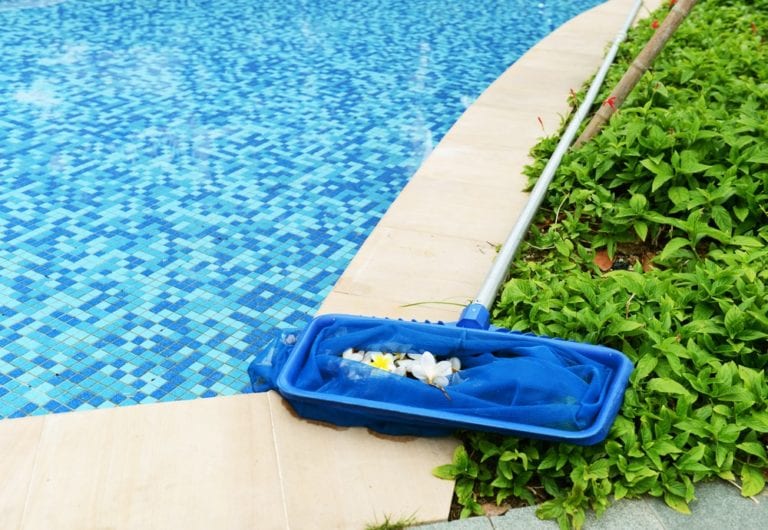
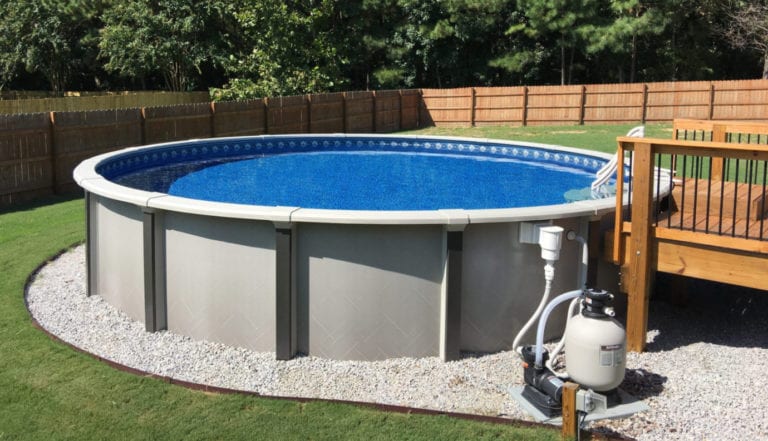
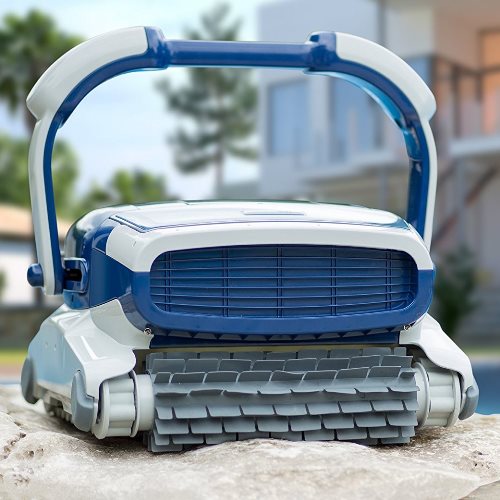
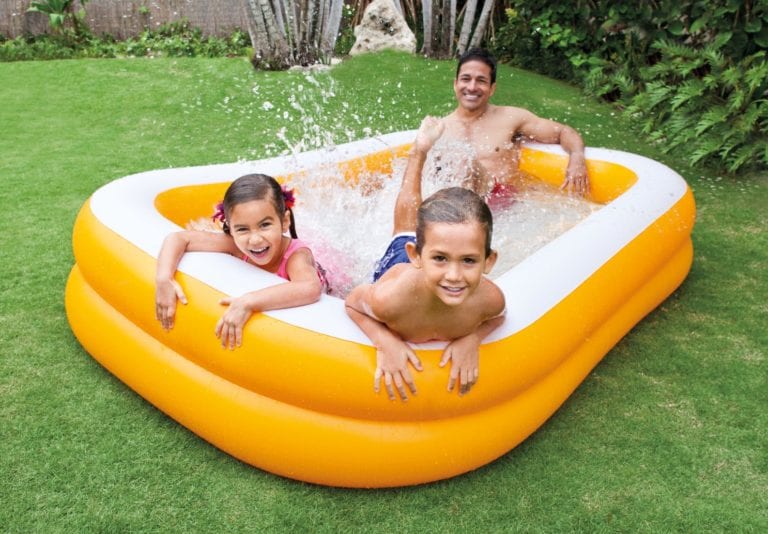
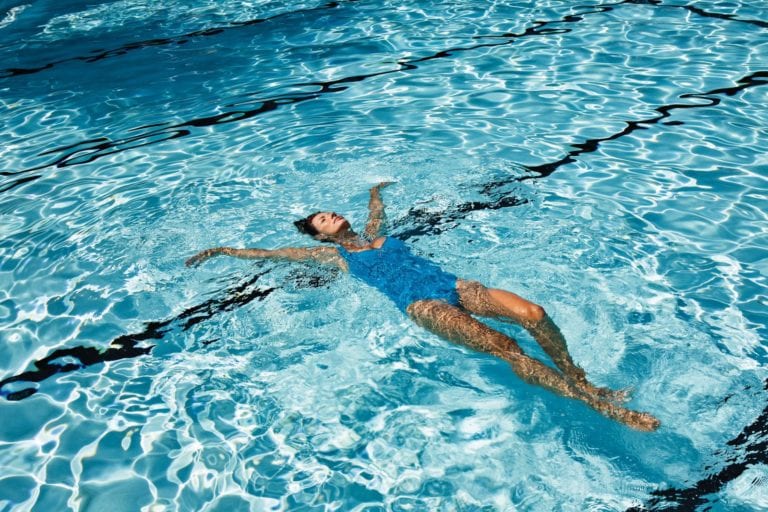
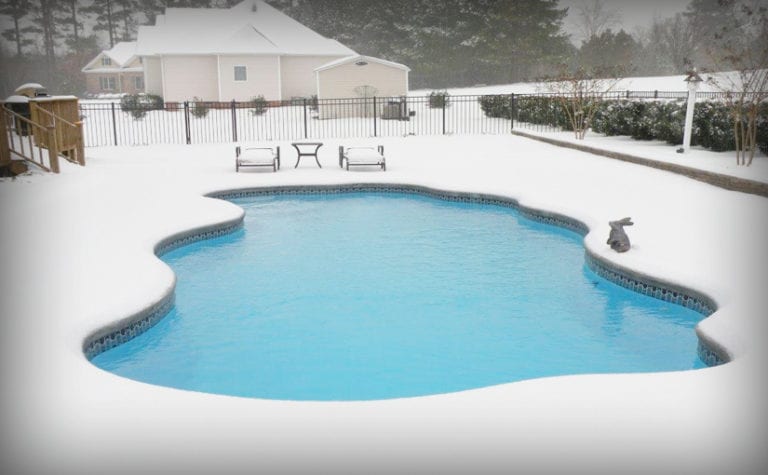
2 Comments
Comments are closed.